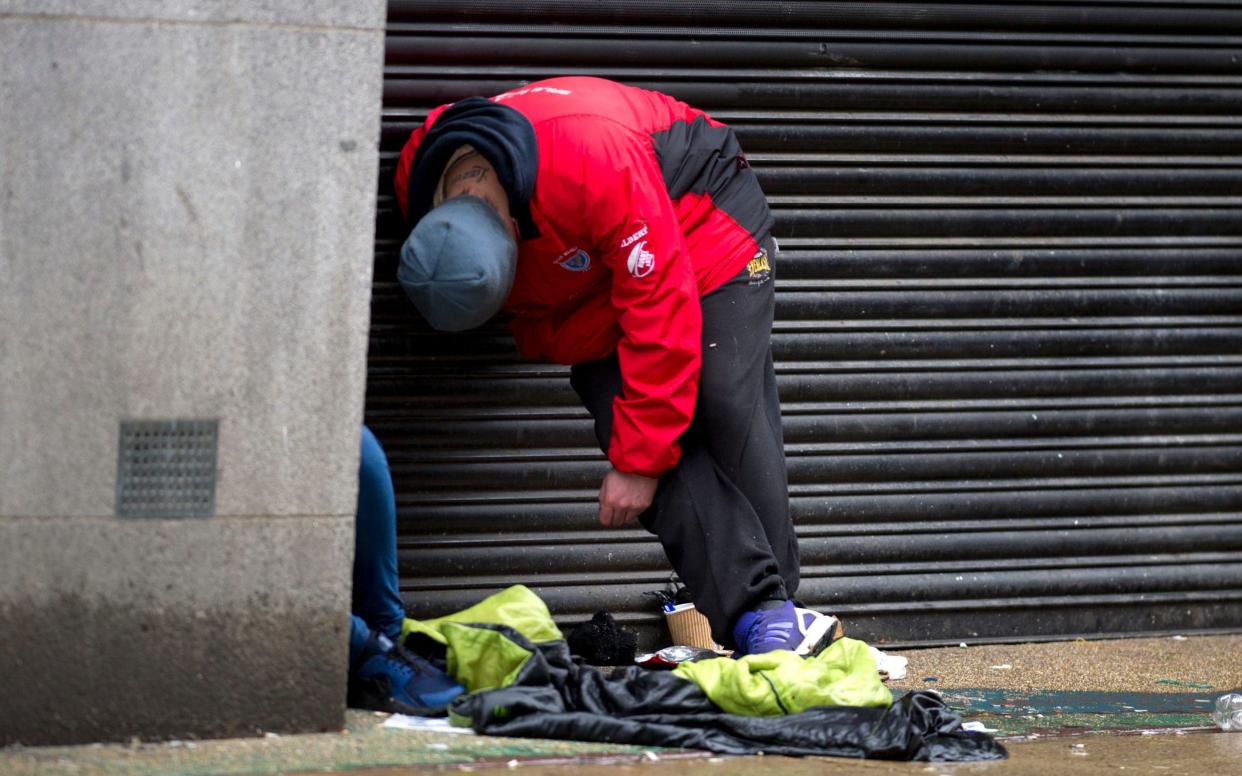Record rise in homeless people dying, ONS figures show amid opioid and spice epidemic

Homeless people are dying at record rates, government statistics have revealed, as experts blame the opioid and spice epidemic for deaths.
Deaths of homeless people increased by 22% to 726 in 2018 - the largest rise since 2013, according to Office for National Statistics (ONS) figures.
Two in five of the deaths were related to drug poisoning - an increase of 55% on 2017 and compared to just 16% for the population as a whole.
Balbir Chatrik, director of policy and communication at Centrepoint, a youth homelessness charity, said: “These figures will shock many people who will wonder how we have reached this point.
“We know that homelessness, particularly street homelessness, can have hugely adverse effects on people’s physical and mental health. The significant increase in drug-related deaths is a cause for serious concern.
“Spice and other synthetic drugs are cheap, easily available and highly addictive and they are the cause of many of the deaths reported today.
“The fact is, we know how to reduce homelessness and prevent deaths like these from happening. We need more social housing, to ensure housing benefit covers the cost of renting privately, and proper funding for mental health and substance misuse services.
“What we need now is the political will and financial resources to put these solutions into practice.”
Ben Humberstone, head of health analysis and life events at the ONS, said: "The deaths of 726 homeless people in England and Wales recorded in 2018 represent an increase of over a fifth on the previous year. That's the largest rise since these figures began in 2013.
"A key driver of the change is the number of deaths related to drug poisoning, which are up by 55% since 2017, compared to 16% for the population as a whole."
Most of the deaths in 2018 were men - with an estimated 641 deaths - with an average age of 45 for men and 43 for women. London had the highest number of deaths, with 20% of the total, followed by the North West, with 14%.
The ONS said that deaths from drugs had more than doubled over the six years it had been recording the data. Figures in 2018 showed there were an estimated 294 drug-related deaths - 40% of the total - compared to 190 deaths in 2017.
The most frequently mentioned substances on the death certificates of those identified as homeless in 2018 were opiates, with heroin or morphine being the most common forms.
Jon Sparkes, Crisis chief executive, said: "It is heart-breaking that hundreds of people were forced to spend the last days of their lives without the dignity of a secure home.
"This is now the second year running where we have known the true scale of the human cost of homelessness, yet still the lessons from these tragic deaths go unlearnt."
Mr Sparkes added: "It's crucial that governments urgently expand the safeguarding system used to investigate the deaths of vulnerable adults to include everyone who has died while street homeless so we can help prevent more people from dying needlessly. "Because in this day and age, there is no excuse for anyone dying without a safe place to call home."
There are around 2,000 fatalities each year — which equate to more than five every day — as a result of overdoses from powerful opioid painkillers. This marks a 41% rise from 10 years ago, according to ONS data.
A 2017 report from the National Crime Agency found that fentanyl - a powerful synthetic opioid - had recently emerged into the UK heroin street market in the north east of England. Researchers concluded that it is “likely a contributory factor in recent multiple heroin-associated deaths”.
Andrew Hayward is director of the Institute of Epidemiology and Health Care and Professor of Infectious Disease Epidemiology and Inclusion Health at University College London said that the unprecedented numbers of homeless deaths constitute a "national public health emergency".
"These deaths are driven by poverty and represent a failure of our society to protect the most vulnerable," he said. "Whilst drug-related deaths are important, homeless people are also much more likely than the general population to die of common treatable conditions such as respiratory disease, heart disease and cancer.”

